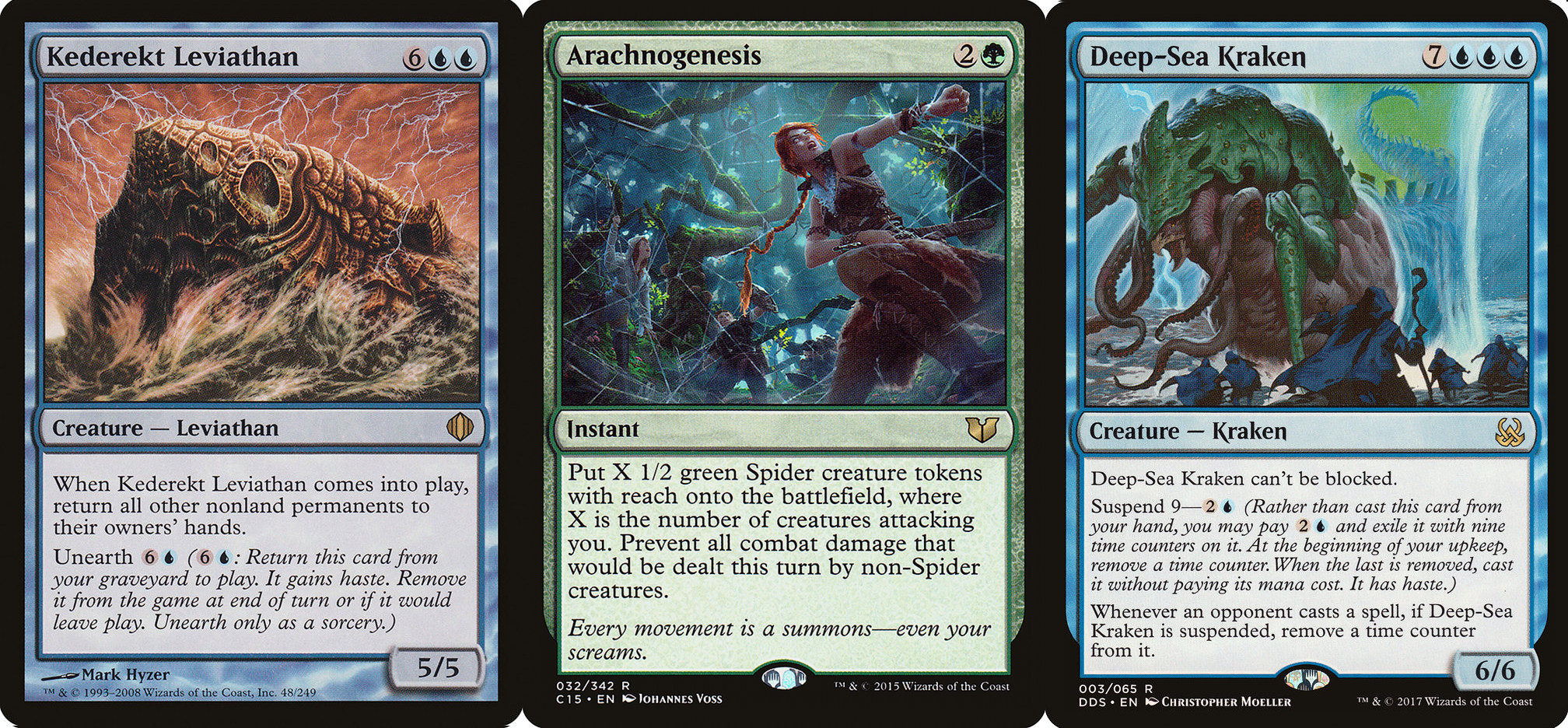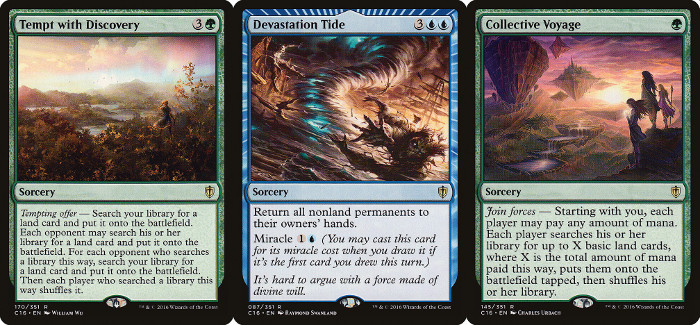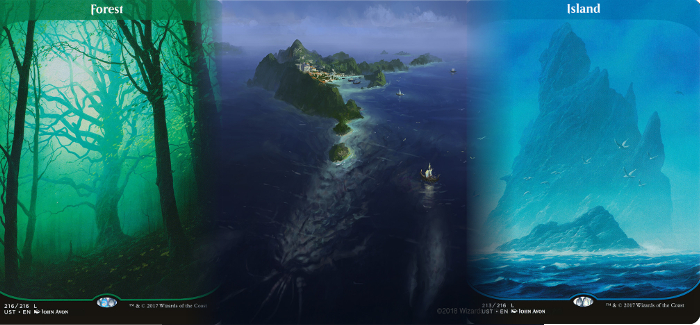Arixmethes and the Borderless World
The concept of a borderless world has taken on a lot of steam lately. Political battles ensue globally as well, as the morals of the movement of people is fervently discussed. The status of your nation-state can be intuitive to most modern people. In many parts of the world, children are raised seeing lines drawn across the face of the globe, delineating zones of cultural and geographic significance. Proponents of the borderless world philosophy see those lines as arbitrary and oppressive, while—as has been discussed Ad NauseamAd Nauseam—those for greater border control see the issue as a matter of national and economic security.
The morals and politics of the real world are fascinating, but not appropriate for a Commander article. However, in Magic: the Gathering, both sides of this debate seem to be correct. Let's discuss that.
Controlling Your Borders
Borders in our card game are not simply defined by the black edges around the cards (silver if you're a little wacky, gold if you're extravagant, and white if you're insane). The greatest border is around your playmat/play area. Magic plays as a territory game of keeping your defenses high. The most important way of keeping yourself safe from invaders is to disincentivize attacking or eliminating threats. You can also incentivize other players to attack each other, but let's discuss the disincentives first.
Disincentivize Attacks
Guaranteeing security is critical to creating a border. There is no bigger or badder security detail in Commander 2018 than Arixmethes, Slumbering IsleArixmethes, Slumbering Isle. Yes, it does begin its shift by sleeping on the job, but there are more reasons than power and toughness why the terramorphically monstrous Kraken works well for this analogy. There are plenty of other Kraken friends that can come out to play, working abusively well while our commander sits around as a Simic Growth ChamberSimic Growth Chamber.
Deep-Sea KrakenDeep-Sea Kraken is a powerful three-drop that can come down early if you don't have a way to ramp from two to four mana. Even though this card is pretty cool, I wouldn't play it early in most games, because it can actually cause people to want to attack you. Ramping into our commander with Rampant GrowthRampant Growth and having six or seven mana on turn four can mean that cards like Ulvenwald HydraUlvenwald Hydra bring us to even bigger creatures. Playing an early Scourge of FleetsScourge of Fleets can be a huge tempo swing, and just the protective barrier you need to stay in the game. Bouncing effects will become integral to our strategy, as with the aforementioned Scourge or Thing in the IceThing in the Ice.

Other than having a strong front line to defend our life total, taxes certainly deter would-be security threats. If you're a longtime reader of this series, you'll know that PropagandaPropaganda and War TaxWar Tax are staples in many of my lists. I've included them here as great effects to help keep away problem players before you get your forces rolling, but they work pretty poorly with Kederekt LeviathanKederekt Leviathan and some other similar effects we want to be playing.
The other way to tax resources is to punish the used resources. I briefly considered running ExhaustionExhaustion and pseudo-Time WalkTime Walk effects, but the simpler solution is FogFog. If you become known as the FogFog deck, you often see a dampening of aggression coming your way until your opponents can figure out how to circumvent your defenses. This is great for you. You are not looking to stave off attacks forever - just until you bring your threats into play. Playing Haze of PollenHaze of Pollen and LullLull benefit from the ability to Cycle them away when they're unneeded. ArachnogenesisArachnogenesis is unique in that it FogFogs while simultaneously building up your forces.
Better than FogFog effects are bounce effects, like AetherizeAetherize. Instant speed bounce like this is great, but just ensuring the other players need to continually recast threats can be the exact tax we need. Late game, the best bounce spells we have are cards like Whelming WaveWhelming Wave and Crush of TentaclesCrush of Tentacles. They bring us into a position of not only neutrality, but dominance. We can keep our big bad dudes like a huge Octopus token or Arixmethes, Slumbering IsleArixmethes, Slumbering Isle while clearing the board of defenders.
Incentivize Attacking Others
There are few cards in Magic that actually incentivize opponents to attack opponents, simply because Wizards of the Coast makes relatively few cards for multiplayer formats. With that said, blue and green get one of the best in the form of Edric, Spymaster of TrestEdric, Spymaster of Trest. An inexpensive card to cast at only three mana, it may just make early creatures think twice about swinging your way, because they'd lose out on that sweet card draw value.
There's another way you can also create incentives for others to not attack you: if someone else knows you have FogFog, which prevents all damage - not just to you, but to anyone - you can form a truce if they help you. Finding a common enemy is an easy way to find an ally. All alliances in war are bound to end at some point in time, but it never hurts to ask someone at the table for a little assistance.
Opening Your Borders
The thing few people will remind you about opening up borders is how much more efficient the costs are. Borders are not just where creatures attack; there is an inherent barrier from utilizing other players' resources. Having everyone pitch in for land ramp costs means everyone gets a massive head start. Collective VoyageCollective Voyage is possibly the most efficiently-costed mana ramp in the game. Playing this on turn one when some people may have left their land untapped means it has the earliest chance to net you additional mana ramp compared to any other spell. This card can scale well and it lets you reach into Leviathan territory very early. Magus of the VineyardMagus of the Vineyard plays essentially the same role, without the opportunity for early powerful plays, but lacks the same late game ceiling of Collective Voyage.

When you have an efficient early Collective VoyageCollective Voyage or Tempt with DiscoveryTempt with Discovery, this not only boosts everyone, but it can make for more level field against the lucky player who drew their Sol RingSol Ring or got some other equally unfair start. These collective boosts benefit the player with the biggest game-enders, which - judging by the Krakens we have already discussed - is hopefully you. This is underutilized in ramp strategies. Only 25% (279 decks) of ramp decks are taking advantage of a rate like this. This comes with a lot of risk, but the reward can well be worth it if you can manage the outcomes. Keep an eye out for who ramps quicker than you do. This is key. There are plenty of decks that can utilize the ramp much more efficiently than you can. What you're doing with this deck can be difficult to work around if combo strategies are big in your meta, or even playing against other "go-big" commanders like Xenegos, God of RevelsXenegos, God of Revels.
Borders are inefficient in another way: they create dangerous situations that could lead to more death. Certainly in Magic, when lots of creatures are out trying to cross into other players' zones, this ensures that more combat will occur, and thus more creatures in the graveyard. Firstly, this means that your cards don't have as many chances to attack. They are underutilized. Secondly, combat like this can fuel plenty of decks, from Meren of Clan Nel TothMeren of Clan Nel Toth to Sharum the HegemonSharum the Hegemon. Blocking isn't always your friend when you can handle the situation in other ways. EvacuationEvacuation is a way to deal with problematic cards in our colors without sending them to the graveyard. Depending on how big graveyard shenanigans are in your meta it may be worth considering running Ground SealGround Seal. It prevents the two aforementioned commander's powers, while continually replacing itself if it happens to get caught in your Devastation TideDevastation Tides. These graveyard decks are still an issue to be wary of, with so many discard effects, but hopefully tight play and the plethora of Time SpiralTime Spiral-esque effects bring enough to the table that you can work around that.
The Action
Arixmethes, Border Guard
View on ArchidektCommander (1)
- 1 Arixmethes, Slumbering IsleArixmethes, Slumbering Isle
Creatures (20)
- 1 Magus of the VineyardMagus of the Vineyard
- 1 Nimbus SwimmerNimbus Swimmer
- 1 Sakura-Tribe ElderSakura-Tribe Elder
- 1 Thing in the IceThing in the Ice
- 1 Edric, Spymaster of TrestEdric, Spymaster of Trest
- 1 Jace's ArchivistJace's Archivist
- 1 Realm SeekersRealm Seekers
- 1 Ulvenwald HydraUlvenwald Hydra
- 1 Pearl Lake AncientPearl Lake Ancient
- 1 Scourge of FleetsScourge of Fleets
- 1 Simic Sky SwallowerSimic Sky Swallower
- 1 TromokratisTromokratis
- 1 Elder Deep-FiendElder Deep-Fiend
- 1 Kederekt LeviathanKederekt Leviathan
- 1 Lorthos, the TidemakerLorthos, the Tidemaker
- 1 Slinn Voda, the Rising DeepSlinn Voda, the Rising Deep
- 1 Stormtide LeviathanStormtide Leviathan
- 1 Trench GorgerTrench Gorger
- 1 Breaching LeviathanBreaching Leviathan
- 1 Deep-Sea KrakenDeep-Sea Kraken
Instants (13)
- 1 FogFog
- 1 Haze of PollenHaze of Pollen
- 1 LullLull
- 1 Moment's PeaceMoment's Peace
- 1 Pull from TomorrowPull from Tomorrow
- 1 Winds of Qal SismaWinds of Qal Sisma
- 1 ArachnogenesisArachnogenesis
- 1 Blue Sun's ZenithBlue Sun's Zenith
- 1 Stroke of GeniusStroke of Genius
- 1 AetherizeAetherize
- 1 Wheel and DealWheel and Deal
- 1 EvacuationEvacuation
- 1 Commit // MemoryCommit // Memory
Sorceries (19)
- 1 Collective VoyageCollective Voyage
- 1 New FrontiersNew Frontiers
- 1 Edge of AutumnEdge of Autumn
- 1 FarseekFarseek
- 1 Nature's LoreNature's Lore
- 1 Rampant GrowthRampant Growth
- 1 Day's UndoingDay's Undoing
- 1 WindfallWindfall
- 1 Tempt with DiscoveryTempt with Discovery
- 1 Whelming WaveWhelming Wave
- 1 Devastation TideDevastation Tide
- 1 Time ReversalTime Reversal
- 1 Crush of TentaclesCrush of Tentacles
- 1 InundateInundate
- 1 Nissa's RenewalNissa's Renewal
- 1 Time SpiralTime Spiral
- 1 Verdent ConfluenceVerdent Confluence
- 1 Coastal BreachCoastal Breach
- 1 Temporal CascadeTemporal Cascade
Artifacts (4)
- 1 Sol RingSol Ring
- 1 Thaumatic CompassThaumatic Compass
- 1 Ghirapur OrreryGhirapur Orrery
- 1 Teferi's Puzzle BoxTeferi's Puzzle Box
Enchantments (3)
- 1 Khalni Heart ExpeditionKhalni Heart Expedition
- 1 PropagandaPropaganda
- 1 War TaxWar Tax
Land (40)
- 1 Alchemists RefugeAlchemists Refuge
- 1 Blighted WoodlandBlighted Woodland
- 1 Breeding PoolBreeding Pool
- 1 Command TowerCommand Tower
- 1 Hinterland HarborHinterland Harbor
- 1 Rogue's PassageRogue's Passage
- 1 Simic Growth ChamberSimic Growth Chamber
- 1 Temple of MysteryTemple of Mystery
- 1 Thespian's StageThespian's Stage
- 1 Yavimaya CoastYavimaya Coast
- 12 ForestForest
- 18 IslandIsland
The first thing you might notice is how many WindfallWindfall type effects are in the deck. The list I have here is quite homogeneous, and a large portion of it is one-time use, non-impacting spells like FogFog and Rampant GrowthRampant Growth. Emptying your hand and filling the other players' hands with lots of cards and casting WindfallWindfall will give you plenty to work with. WindfallWindfall sees play in 16,600 decks, but there is also a whole theme page on EDHREC based on Wheel of FortuneWheel of Fortune effects, and it's the source of inspiration I used to build the deck. I actively chose not to use many of the the staple cards in those decks (like Psychosis CrawlerPsychosis Crawler) because the point of this deck was different enough from the basis for those decks, and didn't want to bog the strategy down with superfluous ideas.
The way games will ideally play out will be to draw one of your many one- or two-cost ramp spells early enough to play the commander on turn three (two if you're lucky), then have six or seven mana on turn four. This gives you enough mana to play a big threat, play some of the six-drop ramp spells, or even play Whelming WaveWhelming Wave plus WindfallWindfall (or similar cards of that effect). The redundancy is key here. I dug deep into ramp spells that wouldn't get caught up into Devastation TideDevastation Tide. It's worse to have your two- and three-mana rocks get swept up than to have to cycle away a card like Edge of AutumnEdge of Autumn (Sol RingSol Ring being the exception because the floor is not bad for the card).
I do know that Arixmethes goes infinite with something like Freed from the ReelFreed from the Reel. Also, Thespian StageThespian Stage works well with Arixmethes and Dark DepthsDark Depths, but those simply sounded like less fun. I'm sure those could easily be slotted into this list for some shenanigans. However, Arixmethes is most interesting to me because it - as a land itself - it plays with the barriers of design and encourages you to play with the borders of the game.
Let me know how you would build this sleepy beast. What do you think could improve this list? What did I miss? What do you want to see from future articles in this series? Feel free to hit me up on here or twitter @rickworldnews.
Rick Amundson
Rick is a professional bookseller, writer and gamer. He could be battling international trade atrocities with his Bachelors Degree in International Studies, but he would rather be playing games of magic, running game night at the bookstore, playing an insidious dungeon master at a convention, or talking and writing about any of the above.
Your opinions are welcome. We love hearing what you think about Magic! We ask that you are always respectful when commenting. Please keep in mind how your comments could be interpreted by others. Personal attacks on our writers or other commenters will not be tolerated. Your comments may be removed if your language could be interpreted as aggressive or disrespectful. You may also be banned from writing further comments.

